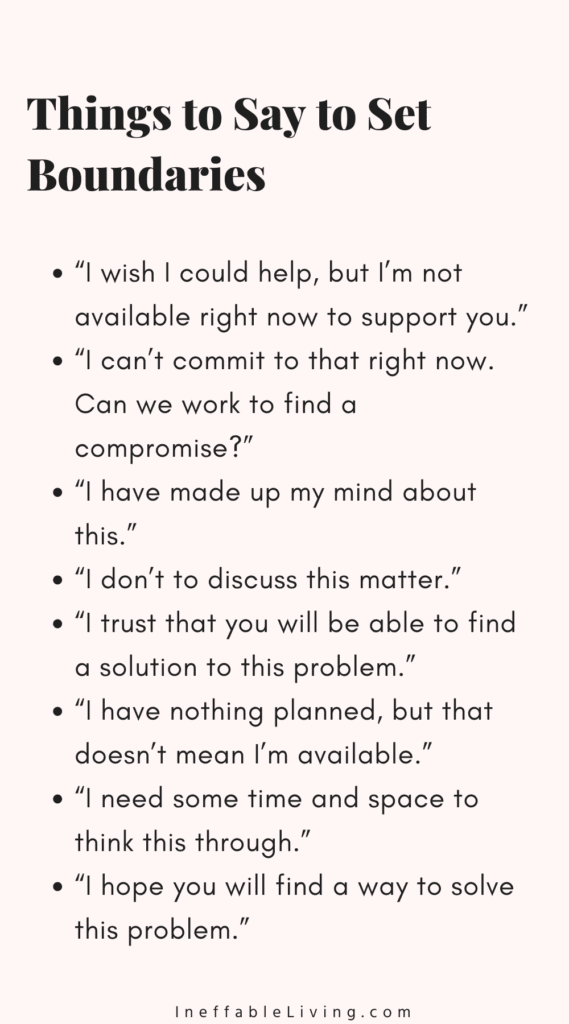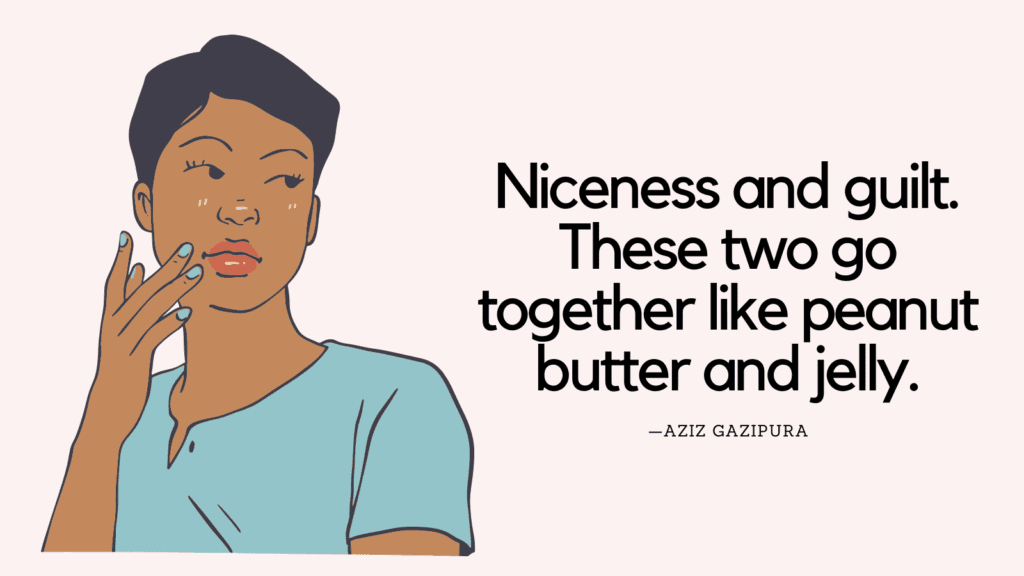This post contains some of the best stop being too nice quotes.
Stop Being Too Nice Quotes
1. “It is not unusual for unsuspecting people to mistake the passive, pleasing, and generous characteristics of a Nice Guy for those of a healthy male. Many women have told me that upon initially meeting these men, they believed the same to be true. Because he seemed different from other men they had been with, the Nice Guy seemed like a real catch.”—Robert A. Glover
2. “After spending years examining the Nice Guy Syndrome from every possible angle, there is only one answer to this question that makes sense: Because it does not feel safe or acceptable for a boy or man to be just who he is.”—Robert A. Glover
3. “These men tend to swing back and forth between being nice and not-so-nice. I have listened to countless wives, partners and girlfriends describe the Dr. Jekyll and Mr. Hyde qualities of Nice Guys”—Robert A. Glover
4. “Becoming a Nice Guy is a way of coping with situations where it does not feel safe or acceptable for a boy or man to be just who he is. Further, the only thing that would make a child or an adult sacrifice one’s self by trying to become something different is a belief that being just who he is must be a bad and/or dangerous thing.”—Robert A. Glover
5. “I have no doubt that Nice Guys have always existed. There have always been Marvin Milquetoast and Walter Mitty kinds of guys out there. I’m sure there has never been a shortage of mama’s boys and henpecked husbands. I believe many little boys are born with a peaceful, generous temperament and grow up to be peaceful, generous men. But after years of working with countless men, I am convinced that a unique combination of social dynamics over the last five decades has produced a plethora of Nice Guys in historically unprecedented numbers.”—Robert A. Glover
Related: Nice Guy Syndrome Test (+Best 19 Practical Strategies To Overcome The Nice Guy Syndrome)
6. “In general, the Nice Guys I have worked with do not report having had a close, bonded relationship with their fathers in childhood.”—Robert A. Glover
7. “I believe the significant number of Nice Guys produced in the ’40s, ’50s, and ’60s is the direct result of mothers, not fathers, teaching their sons how to be male. Consequently, many Nice Guys have adopted a female perspective of masculinity and are comfortable having their manhood defined by women.”—Robert A. Glover
8. “I frequently tell Nice Guys, “If you keep doing what you’ve always done, you’ll keep getting what you’ve always had.””—Robert A. Glover
9. “Just about everything a Nice Guy does is consciously or unconsciously calculated to gain someone’s approval or to avoid disapproval. Nice Guys seek this external validation in just about every relationship and social situation, even from strangers and people they don’t like.”—Robert A. Glover
10. “The seeking of external validation is just one way in which Nice Guys frequently do the opposite of what works. By trying to please everyone, Nice Guys often end up pleasing no one — including themselves.”—Robert A. Glover
Related: What Do Boundaries Sound Like? + 35 Boundaries Examples

11. “Because Nice Guys do not believe they are OK just as they are, they find a multitude of ways to convince themselves and others that they are lovable and desirable. They may focus on something about themselves (physical appearance, talent, intellect), something they do (act nice, dance well, work hard), or even something external to themselves (attractive wife, cute child, nice car) in order to get value and win other’s approval.”—Robert A. Glover
12. “Making the transformation from a Nice Guy to an integrated male doesn’t come about by just trying harder to be a good man. Breaking free from the Nice Guy Syndrome demands embracing a totally different way of viewing oneself and the world, a complete change in one’s personal paradigm.”—Robert A. Glover
13. “Because of their toxic shame, it is impossible for Nice Guys to grasp that people might like them and love them just for who they are. They believe they are bad (the “I’m So Good” Nice Guy is unconscious of this core belief, but it is a core belief nonetheless), therefore they assume that if anyone really got to know them, these people would discover the same thing. Being able to attach themselves to things that make them feel valuable and garner approval from others seems essential if they hope to be loved, get their needs met, and have a problem-free life.”—Robert A. Glover
Related: Healthy Boundaries Quiz (+Free Pdf Worksheets)
14. “Nice Guys seek external validation in just about every social situation, but their quest for approval is the most pronounced in their relationships with women. Nice Guys interpret a woman’s approval as the ultimate validation of their worth.”—Robert A. Glover
15. “Seeking women’s approval requires Nice Guys to constantly monitor the possibility of a woman’s availability. The possibility of availability is a term I use to describe the subjective measure of a woman’s sexual availability. Since Nice Guys see sex as the ultimate form of acceptance, and they believe a woman must be in a good mood before she will have sex, these men are constantly diligent to not do anything that might upset a woman whom they desire.”—Robert A. Glover
16. “Breaking free from the Nice Guy Syndrome involves a radical change in perspective and behavior. Trying to do it halfway will only result in needless suffering.”—Robert A. Glover
17. “Recovery from the Nice Guy Syndrome is dependent on revealing one’s self and receiving support from safe people. It is essential, therefore, that men who want to break free from the Nice Guy Syndrome find safe people to assist them in this process.”—Robert A. Glover
Related: Top 25 Tips On How To Set Boundaries In A Toxic Relationship? (+FREE Worksheets PDF)
18. “Nice Guys believe they should be able do everything on their own. They have a difficult time asking for help and try to hide any signs of imperfection or weakness. Breaking free from the Nice Guy Syndrome involves reversing this pattern.”—Robert A. Glover
19. “Nice Guys are notoriously slow learners and amazingly quick forgetters when their paradigms are challenged. Their inclination is to hang on to belief systems that have proven to be consistently unworkable, yet are so embedded in their unconscious mind that to challenge them is tantamount to heresy. It is difficult for Nice Guys to consider doing something different, even when what they are doing isn’t working.”—Robert A. Glover
20. “Recovery from the Nice Guy Syndrome isn’t about going from one extreme to another. The process of breaking free from ineffective Nice Guy patterns doesn’t involve becoming “not nice.” Rather, it means becoming “integrated.””—Robert A. Glover
21. “Because Nice Guys tend to be very black and white in their thinking, the only alternative they can see to being nice is becoming “bastards” or “jerks.” I frequently remind Nice Guys that the opposite of crazy is still crazy, so becoming a “jerk” isn’t the answer.”—Robert A. Glover
Related: How To Set Boundaries With Narcissistic Parents?

How People Pleasing Can Hurt You
People-pleasing can have several detrimental effects on an individual’s well-being and overall mental health.
Here are some ways in which people-pleasing can hurt you:
1. Increased stress and anxiety
Constantly striving to meet others’ expectations can lead to heightened stress levels and significant anxiety.
The fear of disappointing others or being rejected can create chronic stress, impacting both your physical and mental health.
2. Poor self-esteem
Over time, excessive people-pleasing can erode your self-esteem and sense of self-worth.
When your value becomes dependent on external validation and approval, it becomes challenging to develop a healthy self-image based on your own opinions and values.
3. Lack of authenticity
People-pleasers often sacrifice their authenticity by putting others’ needs and desires before their own.
This can result in losing touch with your true self, as you constantly adapt your behavior to match what you think others expect from you.
Related: Top 10 Books About Setting Boundaries
4. Difficulty setting boundaries
One common characteristic of people-pleasers is difficulty in setting and maintaining personal boundaries.
You may have trouble saying no, overcommit yourself, and neglect your own needs and limits.
This can lead to feeling overwhelmed, resentful, and emotionally drained.
5. Relationships based on false pretenses
People-pleasing can create relationships built on superficial exchanges rather than genuine connections.
If you consistently prioritize others’ needs over your own and suppress your authentic feelings, it becomes challenging to establish deeper and more meaningful connections with others.
Related: Top 19 Journal Prompts For Boundaries
6. Burnout and exhaustion
Constantly striving to please others can lead to burnout and exhaustion.
The excessive demands placed on you can drain your energy and leave you feeling physically, mentally, and emotionally depleted.
7. Inability to assert yourself
People-pleasers often struggle with assertiveness, finding it difficult to express their thoughts, feelings, and needs openly.
This can lead to a lack of voice and the habit of suppressing your own desires, ultimately hindering personal growth and fulfillment.
8. Decreased self-care
When you prioritize others above yourself, self-care tends to take a backseat.
Neglecting your own well-being can lead to increased stress, decreased resilience, and a reduced ability to handle life’s challenges effectively.
Related: +100 Examples of Boundary Violations & How to Deal With It
9. Missed opportunities for personal growth
By constantly seeking external validation and avoiding conflict, people-pleasers can miss out on valuable opportunities for personal growth and self-improvement.
Taking risks, embracing discomfort, and learning from challenging situations are crucial aspects of personal development that can be hindered by people-pleasing behaviors.
10. Resentment and dissatisfaction
Suppressing your own needs and constantly prioritizing others can lead to feelings of resentment, bitterness, and dissatisfaction.
Over time, this can impact your overall happiness and emotional well-being.
It’s important to recognize the negative impact of people-pleasing and work towards establishing healthier boundaries, cultivating self-worth, and prioritizing your own well-being.



